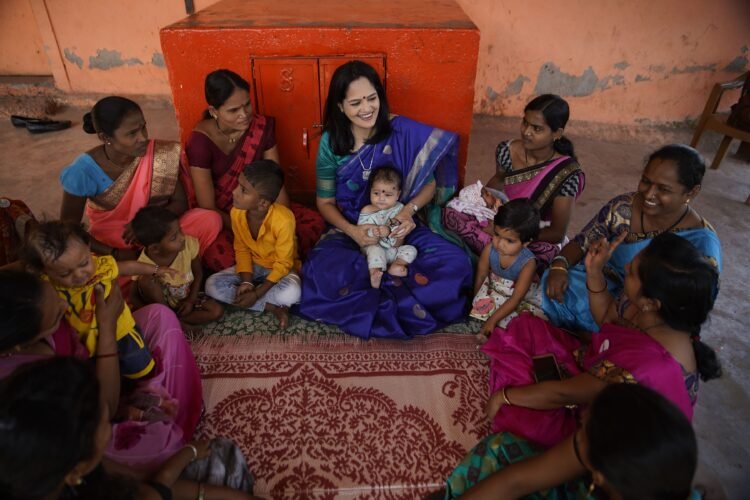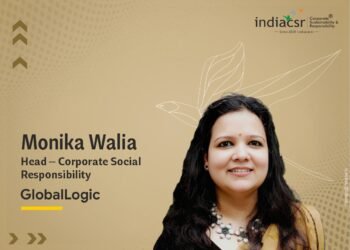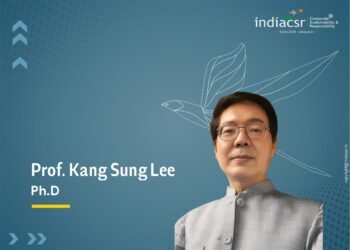The pandemic reinforced the yawning gaps in healthcare and how inequitable the system is for underserved pregnant women and children.
Dr. Aparna Hedge, Founder and Managing Trustee of ARMMAN in a detailed interview with Rusen Kumar, Editor, India CSR, talks about how the organization has leveraged technology to create cost-effective, scalable, non-linear, systemic solutions with proven impact to improve maternal and child health. Dr. Hegde is also a shortlisted candidate for the prestigious ‘Social Entrepreneur of the Year (SEOY) India Award 2021’. She says, “The pandemic reinforced the yawning gaps in healthcare in India and how inequitable the system is, especially for underserved pregnant women and children.” Excerpts:
What was the concept and objective of ARMMAN?
The idea of ARMMAN came from my experiences during a residency at Sion Hospital in Mumbai where women would come with different conditions. I saw first-hand during my residency days how pervasive systemic problems led to preventable maternal and child mortality and morbidity. Most of these cases could be easily avoided if they were detected early on in the antenatal period and managed properly. I saw this happening over and over again.
In the next one hour, three women will die while giving birth somewhere in India. Two children under age five die every minute in India. I realized early on that hospital-based solutions were not enough given the sheer scale of India’s problems. We would need to design solutions that are scalable, accessible to the last woman and child directly in their homes, and yet cost-effective and resource-light.
Thus was born my NGO, ARMMAN. It leverages health to create cost-effective, scalable, gender-sensitive, non-linear, systemic solutions to improve access of pregnant women/mothers to preventive information and train health workers to reduce maternal and child mortality/morbidity. It adopts a “tech plus touch” approach, leveraging the health worker network of Government and partner NGOs along with deep mobile penetration.
How did the organization start operation and where does it stand today?
The organization was founded in 2008, while I was still a student at Stanford, but it was five years before we got our first grant to conduct a randomized controlled trial in three districts of Maharashtra. In 2013, we launched mMitra, a free voice call service sending critical preventive care information during pregnancy and infancy directly to the phones of the enrolled women in their chosen time slot and language. After its launch in Mumbai, the program soon scaled to 9 states in India. In 2019, ARMMAN entered into a partnership with the Ministry of Health and Family Welfare (MoHFW) to implement Kilkari (a voice call service similar to mMitra) and Mobile Academy, a mobile-based refresher training course for frontline health workers (ASHAs) in 13 states of India.
Programs implemented by ARMMAN have now reached over 26 million women and trained 204,000 health workers in 19 states, with plans to scale pan-India by 2025. We have grown to a team of 130 members in different parts of the country.
What is kind of services does the organization offers under its portfolio?
ARMMAN shifts focus from hospital-based care to preventive care for early identification, referral, and treatment of risk factors in pregnant women and children, thereby improving primary health care and referral systems. On one hand, we address the delay in seeking care by improving access to preventive care information, and on the other hand, we train and support health workers for early identification and management of high-risk conditions.
mMitra and Kilkari are weekly free voice call services providing preventive information to women through pregnancy and infancy. Kilkari has reached 23.4 million women in 17 states. mMitra (based in Mumbai) has reached 2.5 million women and will be the sandbox to test innovations for scale-up through Kilkari. We have partnered with Google Research and IIT Madras to pilot the use of AI/data analytics on mMitra database for enhancing program effectiveness and creating targeted programs. We are also testing multimedia content and two-way delivery through WhatsApp for women with access to smartphones.
Mobile Academy is a mobile-based refresher training course for frontline health workers (ASHAs) available in 4 languages across 17 states of India. In severely underserved communities, women leaders are trained via the Arogya Sakhi program to provide home-based pregnancy and infancy care. They are equipped with a medical kit that enables them to perform diagnostic tests and a tablet with an application-based decision support algorithm that enables them to screen for high-risk factors and ensure early referral. Integrated High-Risk Pregnancy Management project focuses on training Auxiliary Nurse Midwives (ANMs), Medical Officers (MOs) and Specialist doctors on high-risk pregnancy management and tracking. The pilot has been launched in Telangana with a planned pan-India scale-up.
How does the company help underprivileged women and children in remote parts of the country?
ARMMAN works in urban and rural geographies with women during pregnancy and infancy, children, and health workers. Since our programs are tech-enabled, it allows us to access the most remote and inaccessible areas of the country by utilising the deep mobile penetration and existing infrastructure of the government and our partner NGOs.
During the pandemic, how has the organization reached out to women and children that need healthcare treatment?
The pandemic reinforced the yawning gaps in healthcare in India and how inequitable the system is, especially for underserved pregnant women and children. It also highlighted the potential of technology-enabled interventions. ARMMAN adapted its extensive technology platform and expertise within a week and launched 4 COVID-19 interventions to support pregnant women, children, and health workers with access to critical information and services in rural and urban areas.
We started a pan-India free Virtual OPD (V-OPD) with the help of volunteer doctors. Over 18,800 women have called our toll-free number (1-800-212-1425) for free consultations with obstetricians and gynecologists. 300,000 pregnant women and mothers of children up to 1 living in urban slums in Mumbai were sent weekly automated voice calls (and text messages) on critical COVID-19 related information directly on their mobile phones, in the local language. Free call-center support along with a data repository linked over 60,000 pregnant women and children with essential health services and facilities. We also set up a Rapid Response System to send critical information through calls/text messages to 800,000 health workers, in partnership with the government.
What were the other key initiatives undertaken by the brand during the lockdown?
The pandemic also resulted in the loss of livelihood for many, especially those in the rural areas who are unable to travel to the cities for work. Due to the dire need in such circumstances, we distributed packets of a dry ration containing food grains and fortified food mixes to underserved families in the Palghar district of Maharashtra.
When certain government health facilities in Palghar were designated as COVID-care centers and faced a shortage of resources to deal with the surge in cases, we supported them with medical equipment such as Oximetrers, Oxygen Concentrators, Oxygen Cylinders, PPE kits, sanitizers, thermal guns, hand gloves, and N95 masks.
Why is the brand looking forward to receiving the Social Entrepreneur of the Year (SEOY) India Award 2021?
ARMMAN is at a critical inflection point in its journey. Being recognized by organizations such as The Schwab Foundation for Social Entrepreneurship and Jubilant Bhartia Foundation on such a prestigious platform will bring visibility to the cause we work for and our interventions.
The recognition would enable a dialogue with other non-profits working in maternal and child health and/or who use technology to deliver their programs at scale, exchange best practices, explore areas for cross-learning and potential collaboration.
It will also help attract the right kind of partnerships and new talent as we augment our programs through targeted content for high-risk conditions, 2-way communication, predictive analytics, and AI and multimedia content.
How will it help the organization to uplift itself in the social space?
We have demonstrated success with managing the largest mobile-health programs of their kind across the world, through a strong partnership with the national and state governments, and have ambitious scale-up and program augmentation plans. This support helps catalyze collaborations with multilateral agencies, improve access to strategic advice/support for organizational development while scaling, and raise critical funds.
(CopyRight@India CSR)






















